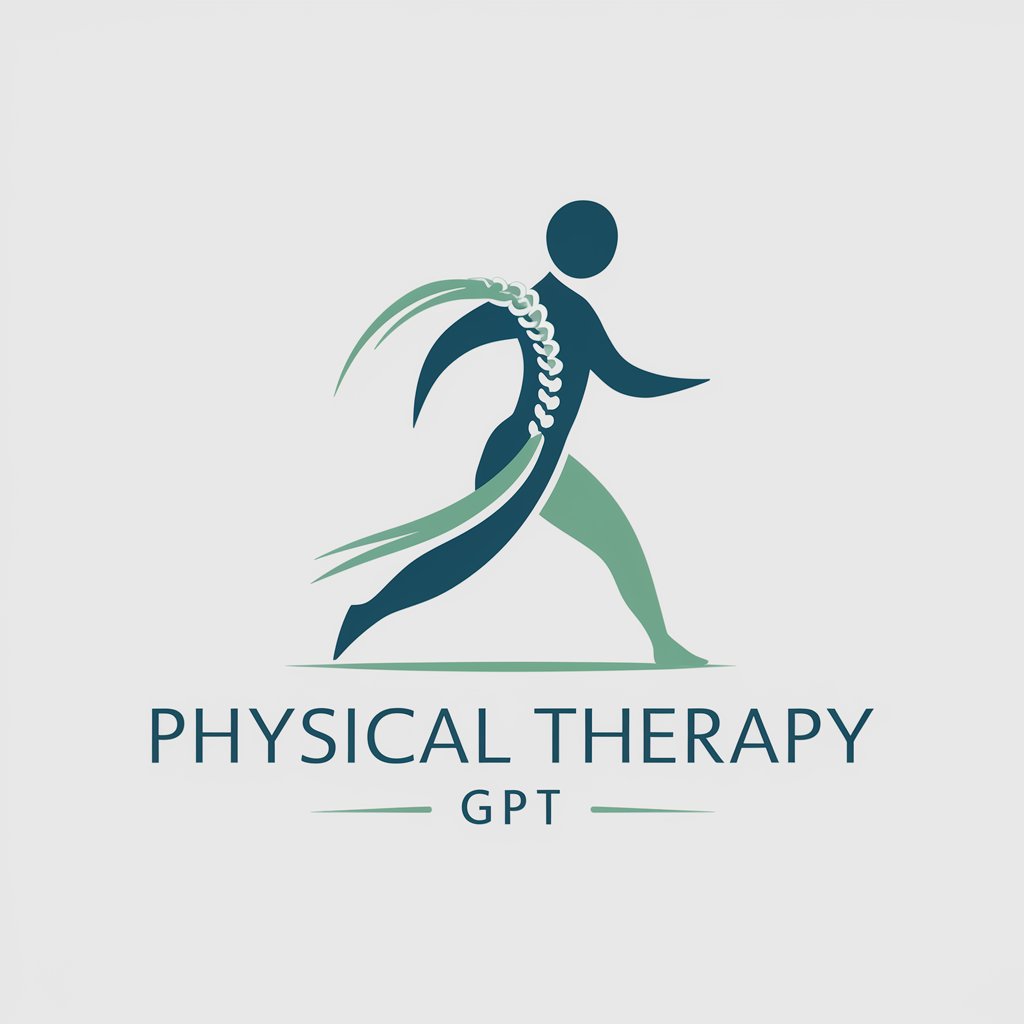
Physical Therapy - Physical Therapy Guidance

Welcome! How can I assist you with your physical therapy needs today?
Empowering Your Recovery with AI
Can you provide exercises for strengthening the lower back?
What are the best stretches to improve flexibility in the hamstrings?
How can I manage knee pain during workouts?
What should I consider when starting a rehabilitation program after a shoulder injury?
Get Embed Code
Overview of Physical Therapy
Physical Therapy (PT) is a specialized area of healthcare focused on the rehabilitation of individuals after injury, surgery, or managing chronic conditions to improve and restore physical function and mobility. It employs a variety of techniques, including exercises, manual therapy, education, and modalities like heat, cold, and electrical stimulation, to aid in the recovery process. An example of PT in action is the rehabilitation of a patient following a knee replacement surgery, where the therapist designs a specific exercise program to strengthen the knee, improve flexibility, and facilitate a return to normal activities. Another scenario is providing strategies and exercises to manage back pain for an office worker, involving posture correction, ergonomic advice, and stretches to alleviate discomfort and prevent further injuries. Powered by ChatGPT-4o。

Core Functions of Physical Therapy
Rehabilitation and Recovery
Example
Post-operative knee rehabilitation
Scenario
A patient undergoes ACL reconstruction surgery and engages in physical therapy to regain strength, flexibility, and function of the knee. The PT designs a program that progresses from gentle range-of-motion exercises to more strenuous activities, tailoring the approach as the patient improves.
Pain Management
Example
Chronic lower back pain management
Scenario
A PT works with a patient experiencing chronic lower back pain, using techniques such as manual therapy, modalities (e.g., heat therapy), and therapeutic exercises to reduce pain, increase mobility, and educate on proper body mechanics.
Prevention and Lifestyle Modification
Example
Fall prevention in older adults
Scenario
To address the high risk of falls in older adults, physical therapists design balance and strength training programs, provide education on safe home environments, and recommend assistive devices to enhance stability and reduce the risk of falls.
Performance Enhancement
Example
Athletic performance improvement
Scenario
Physical therapists work with athletes to improve their physical capabilities, focusing on areas such as strength, flexibility, endurance, and coordination. This might include sport-specific exercises and injury prevention strategies to enhance overall performance.
Who Benefits from Physical Therapy?
Individuals Recovering from Injuries or Surgery
Patients who have suffered injuries (e.g., fractures, sprains) or undergone surgeries (e.g., joint replacements, cardiac surgery) often require PT to regain their pre-injury level of function and prevent complications.
People with Chronic Conditions
Those living with chronic conditions such as arthritis, multiple sclerosis, or chronic obstructive pulmonary disease (COPD) can benefit from physical therapy through pain management, improved mobility, and enhanced quality of life.
Older Adults
Elderly individuals benefit from PT through fall prevention programs, maintenance of functional independence, and management of age-related conditions like osteoporosis or balance disorders.
Athletes
Athletes looking to improve performance, recover from sports-related injuries, or prevent future injuries can utilize PT services to optimize their physical health and athletic capabilities.
Individuals Seeking Pain Relief and Functional Improvement
People experiencing back pain, neck pain, or other musculoskeletal complaints can find relief and functional improvement through physical therapy interventions.

How to Utilize Physical Therapy
Start with a Free Trial
Begin by accessing a free trial at yeschat.ai, allowing you to explore services without a login or the need for ChatGPT Plus.
Identify Your Needs
Evaluate your physical condition or rehabilitation goals to determine the specific areas where physical therapy can be most beneficial.
Choose the Right Program
Select a physical therapy program or set of exercises tailored to your needs, whether it's for recovery, strength building, or improving flexibility.
Engage Regularly
Commit to a regular schedule of physical therapy sessions, as consistency is key to achieving the best outcomes.
Monitor Progress
Keep track of your progress and adjust your therapy plan as needed, in consultation with a physical therapy professional if possible.
Try other advanced and practical GPTs
Morning Routine
Elevate mornings with AI-powered advice

Social Photog
Elevate Your Copy with AI

ChatKeisha
Elevate your productivity with AI-powered support

6.5 Creedmoor
Mastering Range with Precision

Expert Parenting Advice
Empowering Parents with AI-Powered Advice

Bewerbungsschreiben & Lebenslauf prüfer | German
Optimizing Your Career Path with AI

Earth
Empowering eco-friendly decisions with AI

Biernard Beer Explorer
Crafting Your Beer Journey with AI

Live Free Or Die meaning?
Empower your queries with AI-driven insights.

I'm Free meaning?
Unleashing Creativity with AI

Set Me Free meaning?
Empowering Your Quests with AI

Free meaning?
Unleashing the Power of AI for Everyone

FAQs About Physical Therapy
What is physical therapy?
Physical therapy is a healthcare specialty focused on the evaluation, diagnosis, and treatment of physical impairments, disabilities, and pain through physical interventions, exercises, and education.
Who can benefit from physical therapy?
Individuals of all ages with injuries, chronic conditions, or those looking to improve mobility and physical performance can benefit from physical therapy.
What conditions can physical therapy treat?
Physical therapy can treat a wide range of conditions including but not limited to musculoskeletal injuries, neurological conditions, sports injuries, post-operative recovery, and chronic pain management.
How often should I attend physical therapy sessions?
The frequency of physical therapy sessions depends on the individual's condition and goals. A typical schedule could range from several times a week to bi-weekly, as advised by a physical therapist.
Can physical therapy be done at home?
Yes, many physical therapy exercises and treatments can be done at home, especially with virtual guidance. However, some conditions may require in-person sessions for optimal care.